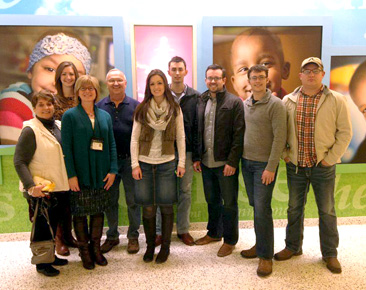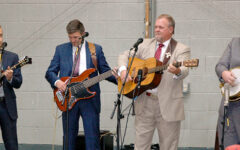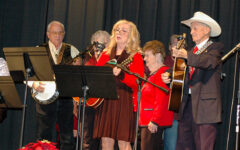
The Musicians Against Childhood Cancer [MACC] festival is next week in Columbus. The festival is a benefit for St. Jude’s Children’s Research Hospital, and has raised over $800,000 to help fight cancer. Darrel and Phyllis Adkins began the MACC after their daughter, Mandy Adkins, passed away. Artists donate their time to play the MACC, in order to help raise funds for St. Jude’s Children’s Research Hospital.
Reigning IBMA Emerging Artists of the Year, Flatt Lonesome was blessed to tour St. Jude’s Children’s Research Hospital with Darrel and Phyllins Adkins last year in order to gain a better understanding of what the MACC is all about. This is an account of their experience, and helps explain why the MACC is so much more than a music festival.
Michael Stockton [MS]: The festival itself is special obviously for the biggest reason: what it’s all about, where they’re donating our time for as worthy of a cause as you’re going to find. But at the same time, everyone’s there; all these musicians that are usually out traveling, playing their shows, and then getting back on the bus and leaving to go to another show. Most of the time, everyone stays there for that whole week, so you kind of get almost like a mini-IBMA, mini-SPBGMA.
Kelsi Harrigill [KH]: You see so many different people and play music together.
MS: It’s kind of like a reunion. So it’s special because the cause is awesome. And then the people that run the festival are so awesome. Darrel and Phyllis are seriously some of the best people ever.
KH: They’re so first class about everything they do.
MS: It’s just like all around — because of the cause, everyone stays there, so it’s a really cool atmosphere.
Dominic Illingworth [DI]: The people come out and support it.
KH: I don’t think any of us realized how important it was, and how big of an effect it had on the kids at St. Jude’s until we got the opportunity to go visit [St. Jude’s] with Darrel and Phyllis. That was a life-changing experience.
MS: Well, I expected to go in there, and this is something that I’ve heard other people that have gone to St. Jude’s say: I expected to go in there and just carry around a box of tissues and cry my eyes out all day. Which I did at some point; some places you’re just — you just can’t believe how sad it is, what’s going on. But then in other places you see these kids over here sitting around playing music with their music director, and they’re having what looks like the time of their life, and they’ve got terminal cancer.
Paul Harrigill [PH]: It’s one of the happiest places you can go to in your life.
MS: If you’re not careful, some kid’s going to run around the corner on a tricycle and run your leg over.
Buddy Robertson [BR]: But then you’ll walk around the corner and see some dad holding his kid crying.
KH: Life-changing is an understatement.
PH: Then, the facilities for the families that have sick kids that are going to have to be at the hospital all the time. The housing is unreal.
MS: That’s another thing that kind of hit home with me, too, is seeing those houses, and the different people that I guess are a lot bigger than us; like, Brad Paisley has a room that he paid for in one of the houses. It’s kind of like a trickle down effect because — not that we’re in a position to help a lot of people, but kind of almost in the same direction when we do these workshops with kids at festivals and stuff. It’s a little easier for me to be like, okay, let’s help these kids; instead of being like, God, I have to teach a workshop this morning. When you see all this stuff that’s going on, to help other people — it’s kind of easier for me to do it.
KH: We were able to take a tour with the lady who was one of the scientists that actually works on the specific type of tumor that Darrel and Phyllis’ daughter had.
MS: She was awesome. Probably the smartest person I’ve ever been around.
KH: She was the most pleasant person. When you think of a woman who’s a scientist, you think of that girl on like NCIS with the goofy glasses and the pigtails, you know?
MS: She wasn’t, though.
KH: She was pretty, and just nice and pleasant. She talked about her son all the time, and she gave us a tour of the entire place. Walked us through every bit of it. We were walking through some of the places with Darrel and Phyllis, and they’d stop and have a story around every corner. We walked into the school that they have at St. Jude’s. When the kids find out they’re going to be there for months at a time, they work with the kids’ previous schools, and they get them on track to where they were when they left. They have individual teachers for some of them who are aggressively sick, and they have other classrooms. They said, “Sometimes we have to take breaks because kids will get sick, or we’ll have to take breaks because kids have treatments.” Treatment comes first. Their health comes first. And then they work school around when they’re feeling well enough to do it. We walked in there, and there’s just all these motivational quotes all over the place. And Darrel and Phyllis are standing there, and it’s like it’s never gonna leave them. It’s never gonna get easier, but they can learn to be happy, live life, and still grieve at the same time.
BR: Those people genuinely love that place. They LIVE to represent and to advertise that place.
DI: That’s their whole life.
KH: It’s incredible. We saw the labs where this lady, where she actually does the research. She spends hours a day in that lab.
BR: You walk in that one little room, and they [Darrel and Phyllis] say, “Guys, this is where all the money’s going to.” With the MACC — that’s where every bit of money: just trying to find the cure for the disease their daughter had.
KH: And that’s what Darrel talks about. What the MACC raises does not go to keep the lights on. It doesn’t go to a general fund at St. Jude’s. It goes specifically to that brain tumor, and she told Darrel that. She said “Because of the MACC, I didn’t have to ask for a grant to buy this machine to do research.”
BR: All the money that comes from the MACC, they don’t have to ask what to do with it; they use it just for research.
DI: It’s harder for them to get money for that research than it is to get money for like the lights, or food, or stuff like that.
KH: They have flags in one of their lobbies. There’s probably 30 flags representing every country that has at least one doctor from St. Jude’s working with kids in those different countries.
BR: It’s unreal.
MS: That place is unbelievable.
PH: It’s an awesome place.
KH: There’s a wall of all these notes, or sayings, or poems, or letters that kids have written when they’re sick, just talking about — “When I am going to not throw up every day?” or “When am I not going to feel nauseous anymore?”
MS: That wall of letters is like the ABCs. And the kids had to fill out — like, they had a letter like ‘D’, and then they had to write some kind of paragraph pertaining to cancer to ‘D.’ One of them was the letter ‘P’, and the little girl wrote like “P is for puke, and I don’t want to puke anymore.”








